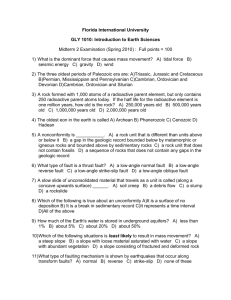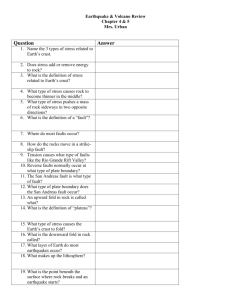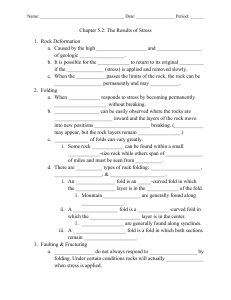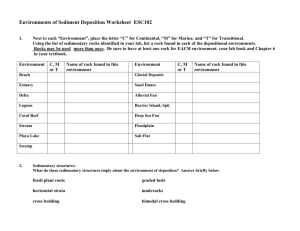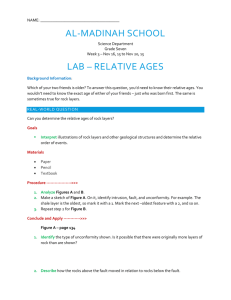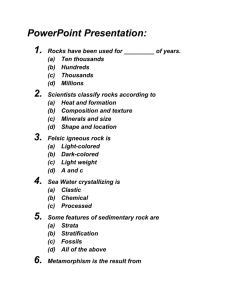Florida International University
advertisement
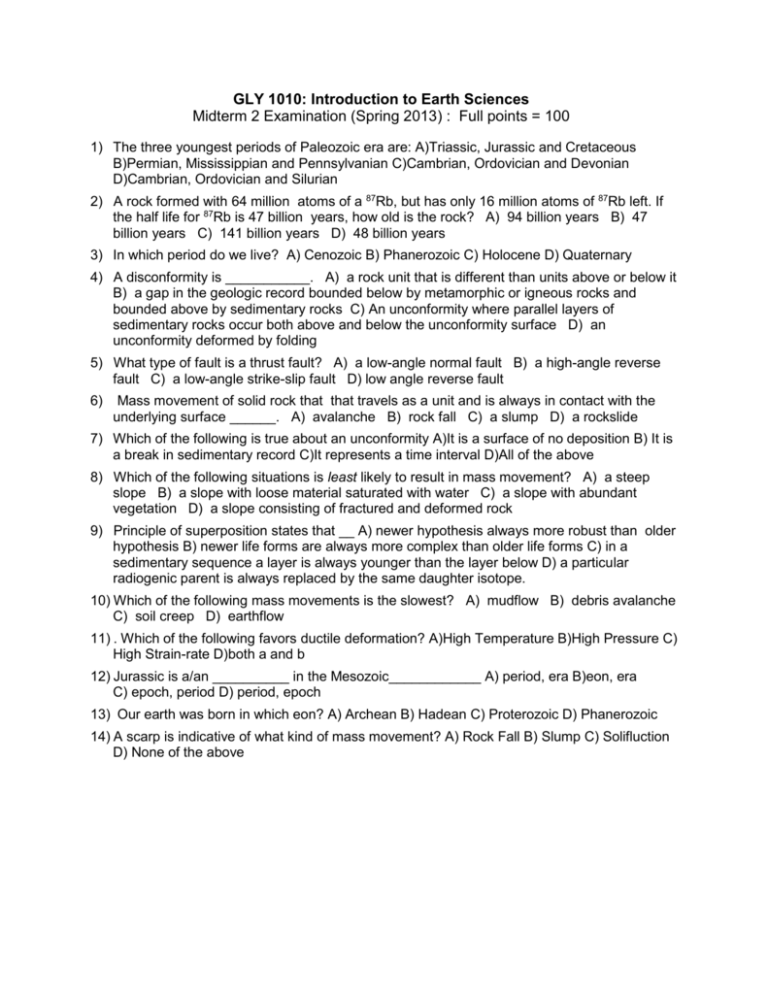
GLY 1010: Introduction to Earth Sciences Midterm 2 Examination (Spring 2013) : Full points = 100 1) The three youngest periods of Paleozoic era are: A)Triassic, Jurassic and Cretaceous B)Permian, Mississippian and Pennsylvanian C)Cambrian, Ordovician and Devonian D)Cambrian, Ordovician and Silurian 2) A rock formed with 64 million atoms of a 87Rb, but has only 16 million atoms of 87Rb left. If the half life for 87Rb is 47 billion years, how old is the rock? A) 94 billion years B) 47 billion years C) 141 billion years D) 48 billion years 3) In which period do we live? A) Cenozoic B) Phanerozoic C) Holocene D) Quaternary 4) A disconformity is ___________. A) a rock unit that is different than units above or below it B) a gap in the geologic record bounded below by metamorphic or igneous rocks and bounded above by sedimentary rocks C) An unconformity where parallel layers of sedimentary rocks occur both above and below the unconformity surface D) an unconformity deformed by folding 5) What type of fault is a thrust fault? A) a low-angle normal fault B) a high-angle reverse fault C) a low-angle strike-slip fault D) low angle reverse fault 6) Mass movement of solid rock that that travels as a unit and is always in contact with the underlying surface ______. A) avalanche B) rock fall C) a slump D) a rockslide 7) Which of the following is true about an unconformity A)It is a surface of no deposition B) It is a break in sedimentary record C)It represents a time interval D)All of the above 8) Which of the following situations is least likely to result in mass movement? A) a steep slope B) a slope with loose material saturated with water C) a slope with abundant vegetation D) a slope consisting of fractured and deformed rock 9) Principle of superposition states that __ A) newer hypothesis always more robust than older hypothesis B) newer life forms are always more complex than older life forms C) in a sedimentary sequence a layer is always younger than the layer below D) a particular radiogenic parent is always replaced by the same daughter isotope. 10) Which of the following mass movements is the slowest? A) mudflow B) debris avalanche C) soil creep D) earthflow 11) . Which of the following favors ductile deformation? A)High Temperature B)High Pressure C) High Strain-rate D)both a and b 12) Jurassic is a/an __________ in the Mesozoic____________ A) period, era B)eon, era C) epoch, period D) period, epoch 13) Our earth was born in which eon? A) Archean B) Hadean C) Proterozoic D) Phanerozoic 14) A scarp is indicative of what kind of mass movement? A) Rock Fall B) Slump C) Solifluction D) None of the above 15) In the geological cross section the igneous intrusion G is A) the oldest unit B) younger than D and E but older than C C) Younger than C,D, E and F D) older than C but younger than F 16) What kind of fault is F? A) reverse B) normal C) thrust D) strike-slip 17) Which pressure-temperature regime represents the amphibolite facies? A) E B) G C)D D) F 18) Which of the following will have the steepest angle of repose A)Very fine quartz sand B) Coarse but rounded beach sand C) Coarse but angular beach sand D) All will have the same angle of repose 19) A fold in which both the limbs dip in the same direction is A) a syncline B) an anticline C) an overturned fold D) a tight fold 20) Which of the followings is a dip-slip fault in which the hanging wall has moved down relative to the foot wall? A) Normal Fault B) Reverse Fault C) Thrust Fault D) all of the above 21) Which of the following lists is arranged in the proper order according to the grade of metamorphism: A) chlorite-garnet- kyanite B) Garnet-sillimanite-chlorite C) –Garnet KyaniteChlorite D) Sillimanite-chlorite-garnet 22) A metamorphic rock where the foliation is defined alternate layers of dark (mafic) and light (felsic) bands A) Slate B) Schist C) Phyllite D) Gneiss 23) . Greenstones are associated with what kind of metamorphism? A) Regional B) Conatct C) Hydrothermal D) cataclastic 24) Which of the following is true for a recumbent fold? A) a steeply plunging fold with a vertical axial plane, B) a steeply plunging fold with nearly horizontal axial plane C) a non-plunging fold with nearly horizontal axial plane D) a non-plunging fold with a vertical axial plane? 25) Which of the following minerals is never found in contact metamorphic rocks? A) Kyanite B) cordierite C) wollastonite D) Andalusite 26) Line on a map representing the first appearance of an index mineral is known as A) index line B) isochron C) isograd D) isotope 27) Navajo Sandstone formation of Utah is a well sorted medium grained red colored sandstone, often showing gigantic cross-beds. These features indicate that the sandstone was deposited in a _________ environment. A) Deep sea B) Glacial C) Lake D) Desert 28) During field work I came across a schist which contained the blue colored amphibole glaucophane. This sample must have come from an ancient _______ A) subduction zone B) Mid-oceanic ridge C) fault plane D) margin of an igneous intrusion. 29) Which among the following sedimentary structures cannot be used to determine if a bed is overturned or right side up? A) symmetrical ripple marks B) cross bedding C) asymmetric or current ripple D) all of them can be used.to determine if a bed is overturned or right side up. 30) A sedimentary rock formed by accumulation of dead radiolarian shell is a ________. A) limestone B) Oolite C) Chert D) Sandstone 31) Which among the following sedimentary structures cannot be used to the direction of current ? A) symmetrical ripple marks B) cross bedding C) asymmetric or current ripple D) all of them can be used to determine the direction of current. 32) What is the effect of water on the angle of repose of a slope made of sand? Water __________ the angle of repose. A) increases the angle of repose B) decreases the angle of repose C) first increases then decreases D) first decreases and then increases 33) I see these on a hill slope: Tilted tombstones, pistol-butt trees, broken sections of fences, rock layers tilted in a down slope direction. What kind of mass wasting do these indicate? A) slump B) creep C) debris flow D) rock fall. 34) Hornfels facies represent what kind of metamorphism? A) Contact B) Regional C) Hydrothermal D) Burial 35) What kind of faults will be typical of a divergent plate margin (like the mid-oceanic ridge)? A) Thrust B) Strike-slip C) Reverse D) Normal 36) A fold in which older rocks occur at the core of the fold is a/an A) anticline B) syncline C) isoclinal D) overturned 37) What is the plunge of a fold? A) dip of the axial plane B) inclination of the fold axis C) angle between the two limbs of the fold D) depth of the folded layers 38) A the trend or orientation of the line of intersection of a plane with the horizontal is called the ____ of the plane. A) Strike B) Dip C) plunge D) net slip 39) I find some coal in a sedimentary layer that contains a dinosaur fossil. What kind of isotopic dating method can I use to accurately date this piece of coal? A) U-Pb B) K-Ar C) Radiocarbon D) none of the above. 40) What is the dominant force that causes mass movement? A) wind B) water C) gravity D) seismic energy released during an earthquake 41) Isotopic dating is possible only if the sample contains sufficient amount of ______ A)only parent isotope B) only daughter isotope C) both a and b D) either a or b 42) Which of the following is a dip-slip fault? A) reverse fault B) normal fault C) thrust fault D) all are dip-slip faults 43) Which among the following is not a foliated rock? A) mylonite B) Gneiss C) Phyllite D) hornfels 44) Which of the following is a plausible temperature in crust at a depth of 20 Km ? A) 20 C B) 400 C C) 800 C D) 1200 C 45) Which of the following rocks indicate a low pressure-high temperature metamorphism? A) Eclogite B) Blue schist C) Amphibolite D) Hornfels
